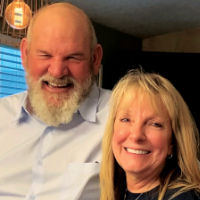
~ Itinerant ministry worldwide; Discipleship; Tribal work in Ivory Coast, Ghana, and Burkina Faso ~
Greetings!
In January I returned to West Africa to give some aid to the believers who were suffering due to the drought and lack of harvest. I met several of the church leaders in the capital of Ghana where we discussed how best to administrate what the Lord had provided. The proverbial story of a young boy walking a beach littered with starfish always comes to mind in these circumstances. In the story an old man saw the boy tossing starfish back into the ocean and spoke discouragingly about his vain efforts to “save” starfish. The boy pondered what his elder spoke and picked up another starfish and tossed it back into the sea saying “Not for that one.”
After our time together and they got home, I heard they had distributed ten tons of corn and a half ton of rice to the saints and others. They also restocked the village school lunch program, plus had some to share with some medical needs.
Meeting the folks from the tribe is always a good time of fellowship. I had rented an apartment on the eighth floor for us to stay together in Accra. I am always amused by the folks from the tribe “discovering;” this time it was an elevator! And the view from so high!
I continued from Ghana to Madagascar to assist the cashew farming industry with a Farmer-to-Farmer assignment. The training was well received, especially when I gave a pruning demonstration with a small chainsaw. It was the first time they had seen this type of technology. In fifteen minutes, I was able to do more than several men could do in a day. Since my return to Oregon the cashew harvest is beginning, and the prices are very high. This will be a great help for their food security.
I am always weaving a Bible message into the training. I often start by reminding the people that God encourages people to seek wisdom, knowledge and understanding and never make money a high priority! I have great respect for African farmers; they work hard, but they will do better by applying proven practices and technology to their hard work. I was to train three groups from different villages. I got two done before the USAID funding was cut off, and they had me leaving Madagascar ASAP. I was able to still train over 225 farmers in improving cashew production.
Madagascar is about as far away from Oregon as you can get. If and when the opportunity presents itself, I will try to return. The director of the program wrote to me with kind and encouraging words after I returned home. He said, “Once you drink the water of Madagascar, you will always have a desire to drink it again.” It truly was a pristine location unspoiled by the modernization of technology and tourism. The widespread use and ownership of mobile phones makes communication available despite the distances.